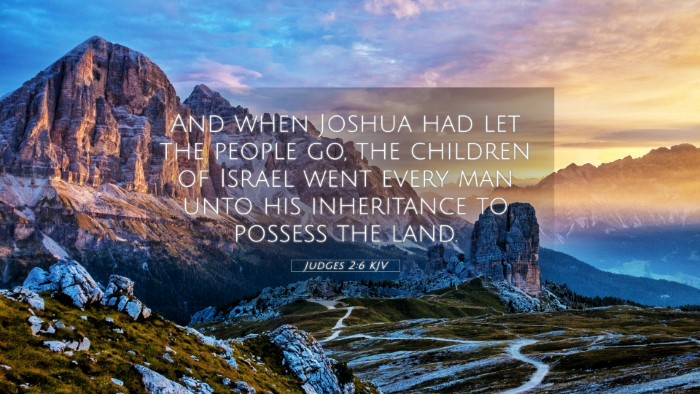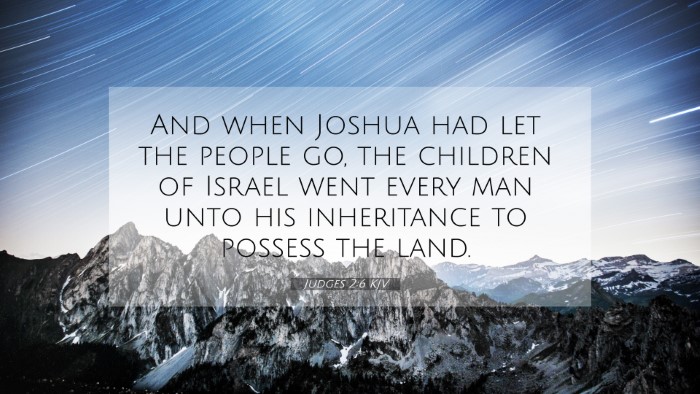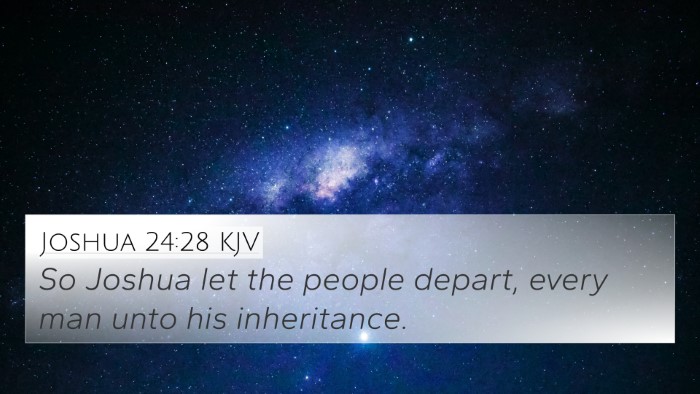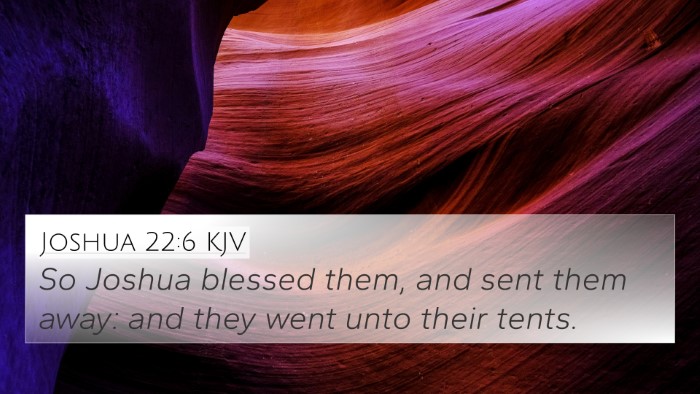Old Testament
Genesis Exodus Leviticus Numbers Deuteronomy Joshua Judges Ruth 1 Samuel 2 Samuel 1 Kings 2 Kings 1 Chronicles 2 Chronicles Ezra Nehemiah Esther Job Psalms Proverbs Ecclesiastes Song of Solomon Isaiah Jeremiah Lamentations Ezekiel Daniel Hosea Joel Amos Obadiah Jonah Micah Nahum Habakkuk Zephaniah Haggai Zechariah MalachiJudges 2:6 Similar Verses
Judges 2:6 Cross References
And when Joshua had let the people go, the children of Israel went every man unto his inheritance to possess the land.
Uncover the Rich Themes and Topics of This Bible Verse
Listed below are the Bible themes associated with Judges 2:6. We invite you to explore each theme to gain deeper insights into the Scriptures.
Judges 2:6 Cross Reference Verses
This section features a detailed cross-reference designed to enrich your understanding of the Scriptures. Below, you will find carefully selected verses that echo the themes and teachings related to Judges 2:6 KJV. Click on any image to explore detailed analyses of related Bible verses and uncover deeper theological insights.
Judges 2:6 Verse Analysis and Similar Verses
Understanding Judges 2:6
Judges 2:6 states: "And when Joshua had let the people go, the children of Israel went every man unto his inheritance to possess the land." This verse occurs at a pivotal moment in the narrative of the Book of Judges, marking a transition in the history of Israel's conquest of Canaan.
Summary of Key Themes
- Transition Period: This verse highlights the transition of leadership from Joshua to the elders, signifying a shift in governance and spiritual direction.
- Personal Inheritance: The individual possession of land denotes God fulfilling His promise to the Israelites.
- Covenantal Faithfulness: It stresses the importance of following God's covenant as the people go to claim their inheritance.
Commentary Insights
Matthew Henry's Commentary: Henry emphasizes that this passage reflects the successful completion of Joshua's mission. He notes that the people were now responsible for their own spiritual journey and the maintenance of the land they inherited.
Albert Barnes' Commentary: Barnes explains that this verse illustrates a significant moment in Israel's history, where the people are left to manage their own affairs and are reminded of their obligations to God. He points out that the act of "going every man unto his inheritance" signifies both blessing and potential disunity if they stray from God’s commandments.
Adam Clarke's Commentary: Clarke provides insight into the historical and cultural context of inheritance in ancient Israel, and how it reflects God's promises. He stresses the faithfulness of God in allowing the Israelites to receive their inheritance, a significant aspect of their identity as God's chosen people.
Related Bible Cross References
- Joshua 21:43-45: "And the Lord gave unto Israel all the land which he swore to give unto their fathers; and they possessed it, and dwelt therein." This passage highlights God's faithfulness in fulfilling His promises to the Israelites.
- Numbers 34:1-12: Outlines the boundaries of the land that Israel was to inherit, providing context for their eventual possession of Canaan.
- Deuteronomy 12:10: "But when you go over Jordan, and dwell in the land which the Lord your God gives you to inherit..." reinforces the concept of inheritance given by God.
- Joshua 1:6-9: God commands Joshua to be strong and courageous as he leads the people into the promised land, setting the stage for the events following Joshua’s leadership.
- Judges 1:1: "Now after the death of Joshua it came to pass, that the children of Israel asked the Lord..." depicts the beginning of the era of judges, highlighting the shift after Joshua's time.
- Hebrews 11:9: "By faith he sojourned in the land of promise, as in a strange country..." emphasizes the faith demonstrated in the inheritance of the land.
- Romans 4:13: "For the promise that he should be the heir of the world was not to Abraham, or to his seed, through the law, but through the righteousness of faith." This reflects the broader theological implications of inheritance in Scripture.
Thematic Connections
The themes explored in Judges 2:6 can be connected to several broader concepts found throughout the Bible:
- Faithfulness of God: Across many scriptures, the idea that God remains faithful to His promises is a recurring theme. Examples include 2 Peter 3:9 and Deuteronomy 7:9.
- Obligation to Follow God: The necessity for the Israelites to adhere to God's commandments is echoed in Exodus 19:5 and Joshua 24:24.
- Ownership and Responsibility: The concept that with blessing comes responsibility can be seen in Matthew 25:14-30 wherein Jesus teaches about the parable of the talents.
- Spiritual Legacy: The impact of leadership transitions in Israel highlights the need for strong spiritual guidelines, underscored in Proverbs 4:7.
Cross-Referencing Insights
Cross-referencing plays a crucial role when examining such a pivotal verse. Tools for Bible cross-referencing can enhance understanding and elucidate how Judges 2:6 interacts with various Biblical texts, deepening the insight into Israel's expectations and responsibilities.
Various methods exist for cross-referencing Bible verses, including utilizing a Bible concordance and various Bible cross-reference guides. These resources allow for an intricate study of how different scriptures relate to each other, revealing layered meanings and interconnections that speak to the integrity of God's Word.
Conclusion
Judges 2:6 serves not only as a historical marker but also as a theological reminder of the continuum of God's covenant with His people. The verse acts as a launch point for exploring the themes of faithfulness, inheritance, and the responsibilities of those who claim God's promises. In the context of overall biblical narrative, the connections made through cross-referencing this verse with others enhances our understanding of God's overarching story of redemption and grace.




